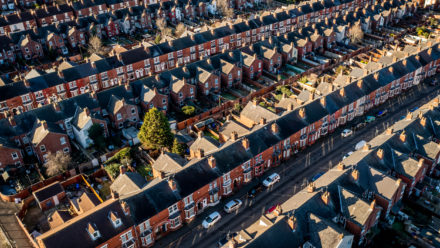Noise complaints
Noise complaints are a common issue that residents and landlords face in their daily lives. Our page offers guidance, spotlight reports, and training options for landlords and residents to help you navigate through this key topic.
On this page
What is a noise complaint?
A noise complaint is a grievance about excessive, disturbing or unreasonable noise coming from a neighbouring property.
Noise complaints can affect people's quality of life, causing physical and emotional stress, sleep disturbance, and a decrease in concentration levels.
Noise costs; it costs individuals their mental health and well-being and it costs landlords in protracted and often futile interventions, multi-agency liaison and staff morale. These costs are underestimated and may be avoidable, to some extent, by adopting the different approaches.
Guidance
Landlord guidance
Landlords can read the guidance to learn what to do if you receive a complaint noise nuisance.
Noise support guide for residents
Residents can use this information to find out how to report noise to a landlord, and what to do if you're not happy with the response.
Spotlight reports

Spotlight on: Noise complaints – time to be heard
Our Spotlight report on noise complaints sheds light on the impact of noise on residents' wellbeing and quality of life. The report includes case studies and recommendations that illustrate the severity of the problem and outline best practice solutions.

Follow up report: Spotlight on noise complaints – Time to be Heard
This follow-up report summarises our evaluation of our Spotlight on noise complaints, Time to be Heard, which we published in October 2022.
We contacted landlords who had attended our initial webinar and all landlords who had featured in the report.
Landlord training
The Centre for Learning has a range of eLearning modules available to landlords via the Learning Hub. Simply log in to access the courses.
Spotlight report on noise complaints eLearning
New eLearning
In this free eLearning module, the Centre for Learning shares results and recommendations of the Housing Ombudsman’s Spotlight on Noise (released October 2022) and the subsequent follow up report (released April 2024).
The course will enable participants to:
- Recall the reasons why we focused on noise for this ‘Spotlight Report’.
- Identify good examples of how landlords are building community relations.
- Select key elements of our recommendations.
- Highlight the steps landlords have taken to change their noise policies and procedures.
Once completed learners will be able to sign up to the virtual workshop on this topic to further discuss the implementation of the recommendations.
The eLearning course has CPD learning hours awarded by the CPD Certification Service to demonstrate your continuing professional development obligations.
Podcast with the Centre for Learning
We publish our podcasts on SoundCloud, offering the opportunity to listen to the latest insights from the Ombudsman while on the go. Tune in to hear about current topics such as damp and mould, noise complaints, and casework from the Ombudsman. Our playlists also feature interviews with special guests, providing updates and insights from across the housing sector.
Spotlight report on noise complaints
This podcast playlist features episodes where Sector Learning and Development Lead Victoria King speaks with Systemic Manager Zoe Miller about the Ombudsman’s Spotlight report on noise complaints- Time to be Heard, and its follow-up report. They discuss the findings and recommendations of the reports and share examples of improvements in how landlords handle noise complaints since the initial report was published in October 2022.
Case studies
The case studies are examples from our case work. We will always try to show one example where the landlord did things right and received a finding of no maladministration and an example where a landlord didn’t act in the correct way and received a finding of severe maladministration or maladministration.
Severe maladministration
After the resident reported the noise to the landlord, it initially responded appropriately. But on the second reporting, despite the resident saying she knew it was not deliberate and simply seeking some soundproofing works, the landlord opened an ASB case.
The landlord did not conduct a risk assessment or start an action plan, and despite the resident’s vulnerabilities, it was not proactive in offering support and monitoring the situation.
The resident often had to chase the landlord for any updates and it took seven months after the initial reporting for the landlord to comment on the outcomes of the noise app recordings she had taken, only for it to tell her it did not meet ASB thresholds.
During the complaint, the landlord’s correspondence towards the resident was often heavy-handed and unsympathetic. It failed to take a victim-centred approach which contributed to a breakdown of trust between the resident and her housing officer.
No maladministration
In this case the landlord consistently listened to the residents’ concerns and acted appropriately and proportionately. The landlord did not take any actions that the resident was not happy with and kept accurate records to ensure that it was providing effective support.
As the reports of noise developed, the landlord continued to listen to the resident and carried out a survey on the building to investigate whether there were structural problems. The outcomes of these surveys was also shared with the resident.
By process of elimination, and without any noise recordings having been submitted, it determined that it was general day to day lifestyle noise, but it remained empathetic towards the resident in its communications and demonstrated a willingness to continue investigating, rather than closing the case due to the lack of evidence.
Landlord Learning Hub
Centre for Learning online platform
The Learning Hub is the Centre for Learning’s dedicated training platform. It is exclusively available for member landlords of the Housing Ombudsman Scheme.
All landlords are required to create an account to access the range of learning materials.
Resident information
When to use the Housing Ombudsman Service
If you are unable to resolve the complaint with your landlord directly via its complaint procedure, this service may be able to provide you with further assistance.
View the residents' pages to find out how to raise and complaint to your landlord and when to escalate your complaint to the Housing Ombudsman Service.
